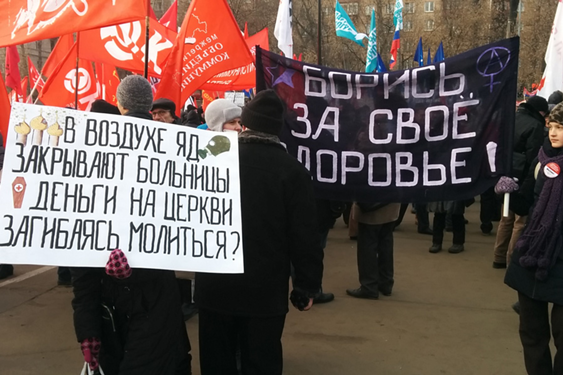In November one of the most discussed subjects in Russian media was the air pollution in Moscow. Muscovites encountered several different pollution problems. In spite of the government attempts to explain and resolve these problems, it looks like most of them are still mysteries.
Muscovites are used to surviving in the thick acrid smog enveloping Moscow in the period of summer heat when peat bogs located outside the city catch fire.
But in November? Here is a video shot in Moscow this month:
It took a long time for authorities to figure out that the smoke was created by the burning in the city’s suburbs of the forest residues in the fight against bark beetles. It took some more days to make a decision to stop the burning. For almost the entire month, Moscow was enveloped in the heavy smog.
On November 11 a strong smell of sulfur hydrogen appeared in many areas of Moscow. Two million people called the hot line of the Moscow government demanding explanation. It took the government several days to detect an oil refinery source for the sulfur hydrogen leakage. But the refinery management strongly denied all the allegations.
The situation with the sulfur hydrogen in Moscow is described with details in a very interesting article in the Washington Post.
On November 26 a Russian web site snob.ru had published an article by art historian Marina Khrustaleva that informed Muscovites about a new situation. her children
became sick with strange symptoms of dizziness and stomach aches and she herself didn’t feel well. Also she and everyone in her neighborhood noticed a strange smell in the air.
Then she read in a paper that a scientific institute in her neighborhood had a leakage of mercury and a Greenpeace report stating concentration of the mercury fumes in her area is 40 times higher then normal. The symptoms of her children sickness looked very much like symptoms of mercury poisoning. Marina immediately took her children out of Moscow, and wrote to Snob.ru, where she has a blog, to inform others about her experience.
236,195 people read Marina Khrustaleva’s article. It was copied by other sites and triggered a panic in the city. Government made no move to alleviate mercury discharge. Several popular papers published their comments.
Subsequently, a very interesting comment appeared in Moscovskij Komsomolets, the most popular Russian tabloid. A correspondent of the paper asked the workers of the nearby factory that allegedly had the mercury leakage whether the workers felt sick the next morning after a leakage took place. Workers answered: “Oh yes, we did feel sick. But we always feel sick in the morning, because we drink too much in the evening”.
Then the correspondent asked opinion of some scientists, and they found Khrustaleva’s fears completely pointless, as “mercury is too heavy for it’s fumes to raise in the air”.
The first several days after Khrustaleva’s publication I failed to find an opinion contradicting the opinion of “scientists” interviewed by the Moscovsky Komsomolets in the Russian media, though I found a lot of evidence to the opposite in American media.
“A new study published in the Journal of Environmental Monitoring has found that mercury in the atmosphere is an oft-ignored form of air pollution, especially in urban areas where concentrations can reach dangerously high levels.”
The new publications, offering proof that there was areal danger of mercury fumes poisoning, has now started to appear in the Russian Internet. Inevitably they triggered public protests.
On Sunday, November 30, about 5,000 Russians marched through Moscow to protest against plans to lay off 10,000 doctors and close 28 hospitals in the capital.
Here is ABC coverage of the event.
I would have liked to add one photo to the ABC report which shows Muscovites concern about condition of the air in the city. Here is a translation of the poem on the banner: “There is poison in the air and they are closing hospitals and building churches where we can pray while dying.”


